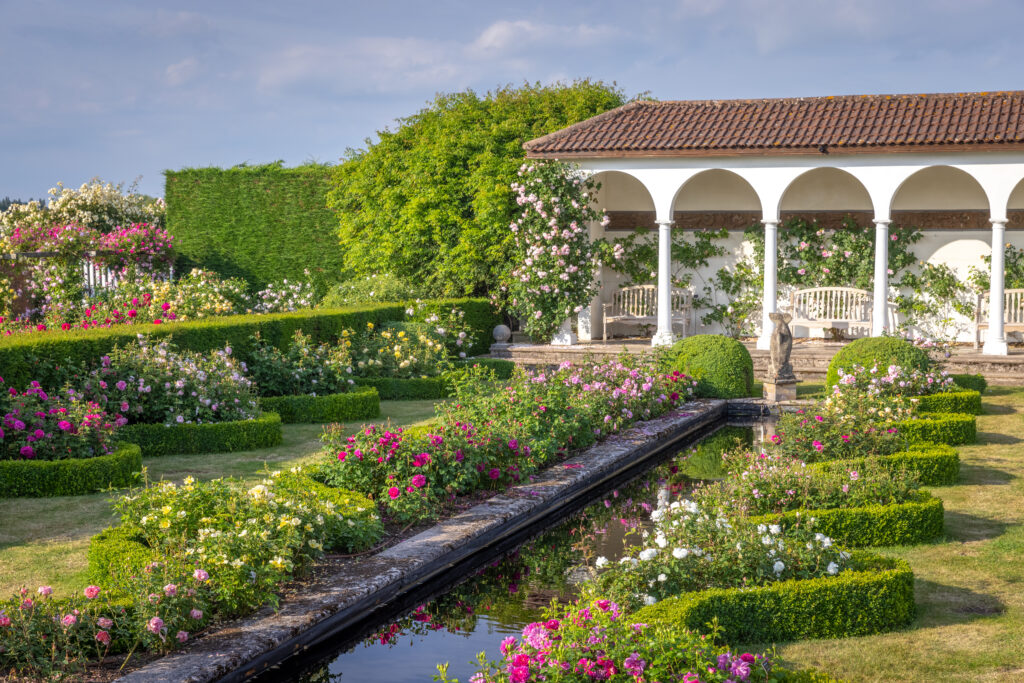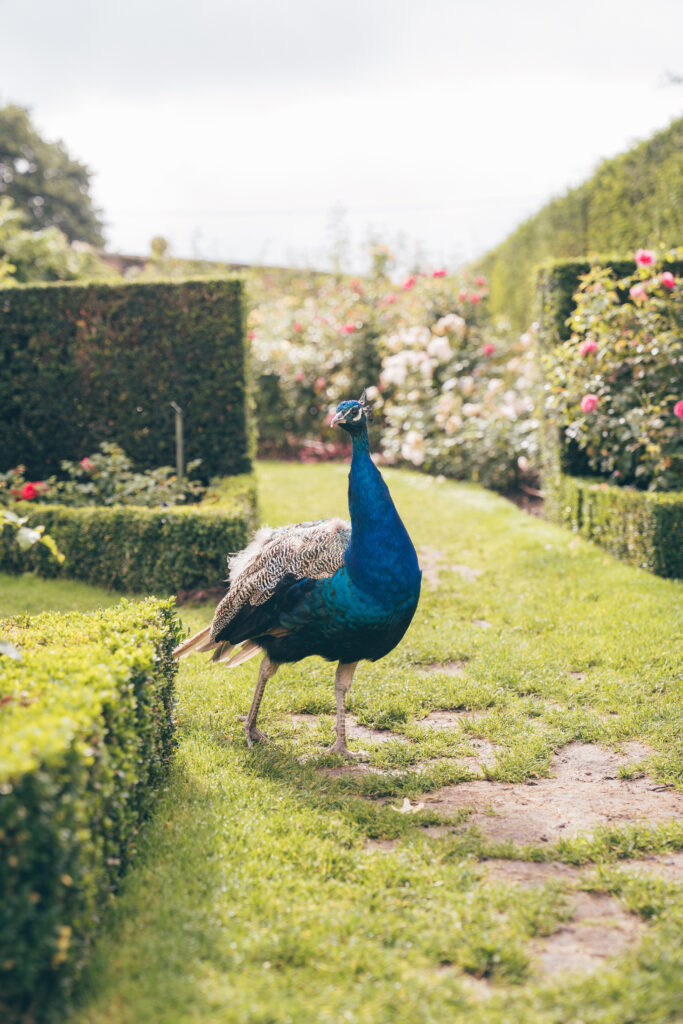David Austin Roses Limited is a world-leading breeder of fine English Roses. A family business based in the Shropshire countryside, the company has over 200 varieties of roses to its name. In 1961, David Austin Snr (1926-2018) introduced his first English Rose, ‘Constance Spry’. Now, 60 years on, his collection of English Roses are celebrated throughout the world. This summer, David Austin Roses are supporting our exhibition Wild & Cultivated: Fashioning the Rose, and we are delighted to share this glimpse behind the scenes at their gardens:
There is something about the home of David Austin Roses that is effortlessly enchanting. Hidden in the Shropshire countryside it is the epitome of Englishness, a little haven of busy gardeners, growers, people and plants going about their daily tasks without fuss or applaud. There is a uniqueness to be found in the tranquil gardens where you may be greeted by a proud resident peacock, or in the shining greenhouses where you may happen upon a rose breeder toiling away quietly in a secluded corner. We like to think of this place as the working home of the English Rose, and we’d love to give you a glimpse behind the scenes.

Strolling from across the fields, we pass, the little lake which is actually part of our reservoir system used to water the roses as part of our sustainable closed-loop set-up. Extended in 2011, it is often visited by dragonflies or bees from the hives resting on the bank, going about their business.
Further on, a hum of activity catches the ear, easily mistaken for the buzz of light aircraft from the nearby RAF Cosford on the horizon. It is actually the sound of activity within the large barns as people in thick gloves pack orders and pot roses with a deftness of skill that belies the thorns of the product.
Although many processes are still manual today, automated machines have allowed us to upscale order production. This modernisation started over 25 years ago with the arrival of the simple, yet effective, conveyor belt system which is still used to this day. Investing in technology has helped us to keep up with demand as David Austin Roses grew as a company and made the jobs of our hard-working employees a little bit easier. We have since invested in custom built machines that make the production process a seamless one. Rose tying, pot washing, bark topping and rose flailing machines mean we can operate much more efficiently and process the thousands of orders that we receive each and every day.

Over the way are our growing or trial fields where the landscape and activity varies throughout the seasons. Exposed to the elements, during the winter months we find brown earthy expanses being farmed and prepared for the next rose crop. In summer months, we will be greeted by a wash of colour reminiscent of a watercolour painting as all the colours of the rose varieties blend into one another.
Technology has, and continues, to impact every aspect of our business, the contrast between old and new visible as the old tractors work happily alongside the newest modern electric additions. We often take for granted the convenience of smartphones which have removed the need to track down a colleague on-site, often trekking across the fields in search of an answer to a question. Now, a simple call or message gives us the solution within moments and can allow conversations to happen easily, even when miles apart.
Technology has also been instrumental in improving the health and wellbeing of our plants. The introduction of bio-mass boilers ensures a reliable heat source for the germination of seeds and growth of new rose seedlings in our greenhouses. Neutron probes are used to measure moisture levels in our production crops and notify us of the optimum watering time required to ensure our roses are kept as healthy as possible at all times.
The office is where change is most noticeable, as computers have become a necessity and technology has advanced, there has been a need for more space. No longer could we get away with the accounts being written up by hand by Beryl as she leant against the boiler in the old farmhouse, or could we manage with orders being processed and packed on the kitchen table by hand. From Betamax systems to networked servers and now essential remote cloud working, technology has ensured the running of our business is still possible.

As the company has evolved and expanded, so too have our buildings. Old barns have become ‘new offices’ and cattle sheds, rudimentary event spaces for Christmas parties. Portacabins became temporary offices prior to the building of the office block in 2008 and in some ways, nothing has changed, as we have relied once more on portacabins to provide further makeshift offices during the pandemic.
Away from the eye of the public, there are old barns and outbuildings awaiting their next responsibility, delightfully decorated with climbing roses growing for 30 years or more and filled with trinkets, gardening history or old wrought iron fireplaces. The blue doors of the wonderful old farmhouse are the gateway to Mr Austin’s panelled library, floor-to-ceiling in gardening books, English literature, and poetry. Out in the private garden the uniquely designed stilted hornbeam hedge and surrounding moat are tended to with the utmost care of our expert gardeners. Each year they have over 1000m of hedge to cut and over 5000 roses to prune, continuously refreshing and replanting new varieties both in the private and public gardens.
Hundreds of thousands of visitors have enjoyed a stroll through our magnificent rose gardens, built in the late 80s by Mr Austin to showcase his creations, they are now home to the National Collection of English Roses. In true David Austin-style the gardens remain free to visit for all to enjoy and delight in a blaze of colour and profusion of scent especially during the summer months when the roses are in full bloom.

Stepping into these magnificent gardens, set across two acres, with over 5000 rose plants on display in the five themed rose gardens, you can’t help but be inspired. Pergola-framed walkways enveloped in colour and scent are interspersed with stunning displays of roses, perfectly at home within their given space. Amble along the canal where roses in undulating beds are reflected in the still water or take a moment to sit within the commanding Renaissance Pavilion and take in the peaceful surroundings. Once ready, why not pop next door to The Lion Garden where many visitors have offered a friendly pat to the statue of the lion, sculpted by the late Pat Austin. The formal Victorian Walled Garden provides another wonderful treat for the senses, its large circular wall standing 8ft tall and 100 yards long, offering an impressively vast backdrop along which many of our beautiful climbing roses grow. There will always be a diligent gardener or David Austin Rose Expert, attending to and pruning our garden roses, ensuring they look pristine.
There are few things better than sitting in a rose garden and enjoying a nice cup of tea and a slice of homemade cake. For that reason, in 2001 the old barn, that had been converted into offices was reimagined, creating our Plant Centre, Gift Shop, Garden Tea Room and traditional timber-framed Restaurant. Quintessentially English and offering lovely home-cooked food, the restaurant quickly became a popular attraction, turning a visit to the gardens into a wonderful day out.
From a simple greenhouse and selling roses direct from the family’s kitchen table to over 100 acres of fields today, each one of our rose varieties has originated from this magical place, imparting its qualities into every rose. Despite change and progress, there remains a unique charm, where traditional and contemporary work contentedly side by side. The human ingenuity of our gentle but detailed work has made it a place where our people are happy to stay and settle, raise their families and become part of the continuing legacy that is David Austin Roses.
We look forward to more seasons of change, as we develop our land further, introduce new technologies and expand our offices, always keeping our people at the heart of everything we do.
—
